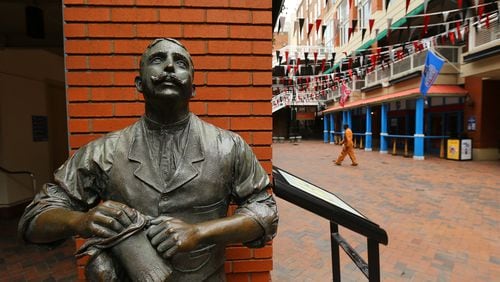Underground Atlanta’s history
- 1869: Georgia Railroad Freight Depot built.
- 1870: Atlanta population surpasses 37,000. Alabama Street is filled with traffic, including a horse-drawn trolley.
- 1910-1929: Bridges are built over the area for cars, raising the street level by one to 1 1/2 stories. Businesses move to the second floor. During Prohibition, ground-floor storefronts are used for storage and occasionally speakeasies. By the 1960s, the lower level is largely abandoned.
- 1967: Underground Atlanta is incorporated.
- 1969: Underground Atlanta opens with bars and restaurants, an immediate hot spot for Atlanta nightlife, including Dante's Down the Hatch and The Blarney Stone.
- 1980: Underground is largely closed.
- 1982: Mayor Andrew Young proposes to redevelop Underground in a bid to revive the city's downtown district.
- 1987: Rouse Co. begins a $142 million renovation of Underground.
- 1989: Underground reopens as a shopping mall with restaurants, bars and clubs.
- 1990: Atlantans gather at Underground to celebrate the awarding of the 1996 Olympics to Atlanta.
- 1990: The World of Coca-Cola opens adjacent to Underground.
- 1992: Rioters smash windows in the wake of the Rodney King verdict. Sales drop quickly.
- 1996: Underground Festival Inc., a private entity that operates the center, loses $6.5 million despite boost from the Olympics.
- 1999: Atlanta hires a team led by O'Leary Partners to manage the district.
- 2004: Atlanta passes a special ordinance allowing bars in the complex to serve drinks until 4 a.m.
- 2007: World of Coca-Cola closes its Underground location and moves to Centennial Olympic Park.
- 2009: Dan O'Leary and John Aderhold, the leaseholders at Underground, propose casino-style gambling at Underground that would benefit the HOPE Scholarship. The idea ultimately goes nowhere under then-Gov. Sonny Perdue and the Georgia Lottery board, which would have to approve the plan. Kasim Reed, as a candidate for Atlanta mayor, was opposed as well.
- 2012: City officials step up conversations over Underground's future, developer Dan O'Leary vows to search for a "big idea" to change Underground's dynamic.
- March 2014: Mayor Kasim Reed announces plan to buy out O'Leary's lease and eventually sell the Underground property to a new developer.
Source: Staff research
The time for Underground Atlanta has come. Again.
History repeated itself last week when Mayor Kasim Reed announced a new phase in the ailing shopping mall’s future: plans to rid the city of the responsibility – and cost — of Underground by buying out the management company and selling it to a developer.
The news set off speculation about what will become of the multi-tiered facility. Some see a hotel. Some want office space. Others see student housing or maybe an arts campus.
In a city that loves to dream big, there’s no shortage of ideas. And Reed wants to let the private sector – or maybe Georgia State University – turn a white elephant into a prize.
“Sometimes the best redevelopment of the project is demolishing it,” said prolific Atlanta developer Jeff Fuqua, whose firm might be interested in the site.
Fuqua said the city stepping out of the way is a huge enticement — not to mention the incentives the city can provide to willing parties.
“They can provide incentives, which (are) critical, but at the end I believe private enterprise is the ultimate avenue to getting things done,” he said.
Reed said selling Underground is more about the city’s bottom line than downtown revitalization. The mayor needs to find anywhere from $15 million to $17 million in savings this year to prepare for a 2015 infrastructure bond referendum worth up to $250 million.
Selling the property could help save the city about $8 million it spends annually to pay off $142 million bonds taken out in the 1980s to redevelop the area.
“I don’t care if it’s a ball field. I have a preference for it thriving, but I care about the city’s balance sheet,” Reed said last week.
He’s also signaled his desire for “university energy” at Underground, and many have speculated nearby Georgia State could absorb the property. University officials haven’t commented.
The mayor told downtown coalition Central Atlanta Progress that the city’s sale of the former City Hall East, a cavernous former Sears warehouse, is a model. Jamestown Properties acquired that complex a few years ago and is soon to open Ponce City Market, a $200 million-plus mix of offices, retail, restaurants and residences on the Atlanta Beltline.
On Friday, Reed was more reserved in describing what could come.
“I’m not advocating some grand vision of Underground, but what I do want to do is engage the private sector,” Reed said.
Underground was born as a bar and entertainment district in 1969 but after a brief heyday went dormant. Under Mayor Andrew Young, the city worked with noted developer Rouse Co. to turn Underground into a shopping mall, which opened 1989.
For a time the new version drew large and diverse crowds, but the excitement waned and new development went north to the Centennial Park and CNN Center area.
Reed says now is the time for the private market to step in. A spokeswoman said the city plans to request proposals from developers, establish objectives for the project and score proposals based on financial considerations and developers' vision.
Some developers and dreamers say a strengthening economy and renewed interest in urban development make the time right – again – to remake Underground.
Larry Gellerstedt, the president and CEO of Atlanta-based real estate investment trust Cousins Properties, credits Reed with sensing an improving economy as an opportunity to shed a drain on the city’s finances and turn it into a hub of activity for an ailing section of downtown.
Downtown is in the midst of its greatest swing of new investment since the 1996 Summer Olympic Games, Gellerstedt said, ticking off high-dollar projects including the Atlanta Streetcar, Center for Civil and Human Rights, College Football Hall of Fame and the new Falcons stadium.
Young people generally want to live in cities, many millenials eschew cars and Underground is at the center of the city’s busiest rapid transit hub at Five Points, Gellerstedt said.
But much of the new investment downtown has focused north of the Five Points MARTA station. Southern downtown has lacked significant investment for decades.
A mass transit hub in the “Gulch” near CNN Center linking bus, MARTA rail and commuter trains has been a decades-long dream – one in which Cousins has done planning. A re-imagined Underground nearby could add momentum to that long-promised vision, Gellerstedt said.
“The acreage from the State Capitol to the Gulch is an unprecedented opportunity,” Gellerstedt said. “You need a stimulus to get it going.”
For any redevelopment to succeed the area needs to feel safe and rundown buildings that surround Underground need renewal, said Karen Bremer, executive director of the Georgia Restaurant Association.
“Underground has to be part of a comprehensive plan that touches more than Underground property,” said Bremer, who formerly ran City Grill and Dailey’s restaurants downtown. Redevelopment projects in Savannah and Charleston, cities where locals and tourists gather downtown, are examples that Atlanta should emulate, she said.
A downtown site could be attractive to Georgia’s booming television, film and music businesses, said David Marvin, founder and president of Legacy Property Group, the developer behind the Hilton Garden Inn, Embassy Suites and a planned apartment tower near the Georgia Aquarium.
“While it’s a daunting task to transform Underground at some level because it’s been tried unsuccessfully a couple times, (the property) does have really good bones,” Marvin said.
But Underground will be competing for developers’ affections with other major properties: Fort McPherson, the Civic Center site and Turner Field after the Braves leave.
A.J. Robinson, downtown Atlanta’s ultimate cheerleader as the head of Central Atlanta Progress, sees a sort of mixed-use tower atop of Underground’s historic belly. He said it will have to cater to Georgia State students to succeed.
Robinson believes developers will line up to bid on Underground, pointing to the fact that Five Points still delivers a stream of pedestrians headed to downtown government buildings or the courthouse.
“I really believe, even 50 years later, I think this has super potential,” he said.






